Hystrix 断路器模式 – SpringCloud
原文:https://howtodoinjava.com/spring-cloud/spring-hystrix-circuit-breaker-tutorial/
了解如何利用称为 Hystrix 的 Spring cloud Netflix 堆栈组件之一来实现断路器,同时调用基础微服务。 通常需要在某些基础服务永久关闭/抛出错误的应用程序中启用容错功能,我们需要自动退回到程序执行的不同路径。 这与使用大量底层微服务的生态系统的分布式计算风格有关。 这是断路器模式的帮助之处,Hystrix 是构建此断路器的工具。
Hystrix 示例
Hystrix 配置通过四个主要步骤完成。
-
添加 Hystrix 启动器和仪表板依赖项。
<dependency> <groupId>org.springframework.cloud</groupId> <artifactId>spring-cloud-starter-hystrix</artifactId> </dependency> <dependency> <groupId>org.springframework.cloud</groupId> <artifactId>spring-cloud-starter-hystrix-dashboard</artifactId> </dependency> - 添加
@EnableCircuitBreaker注解 - 添加
@EnableHystrixDashboard注解 - 添加注解
@HystrixCommand(fallbackMethod = "myFallbackMethod")
什么是断路器模式?
如果我们在基于微服务的体系结构上设计系统,则通常会开发许多微服务,并且这些微服务会在实现某些业务目标时相互影响很大。 现在,我们所有人都可以假设,如果所有服务都已启动并且正在运行,并且每个服务的响应时间令人满意,那么这将给出预期的结果。
现在,如果当前生态系统的任何服务出现问题并停止为请求提供服务,将会发生什么。 这将导致超时/异常,并且由于此单点故障,整个生态系统将变得不稳定。
在这里,断路器模式非常方便,一旦发现任何此类情况,它将流量重定向到回退路径。 它还会密切监视有缺陷的服务,并在服务恢复正常后恢复流量。
因此,断路器是进行服务调用的方法的一种包装,它监视服务的运行状况,一旦出现问题,断路器将跳闸,所有进一步的调用都将返回到断路器,最后一旦服务回来了就自动恢复! 太酷了吧?
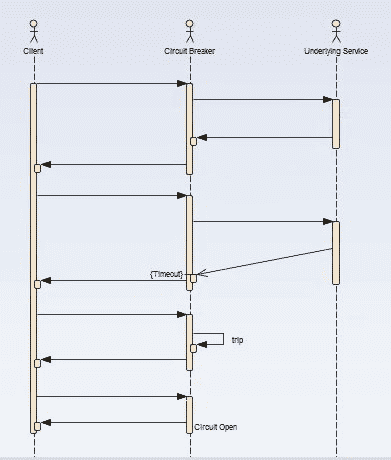
断路器调用顺序
Hystrix 断路器示例
为了演示断路器,我们将创建以下两个微服务,其中第一个微服务依赖于另一个。
- 学生微服务 – 将提供
Student实体的一些基本功能。 这将是一个基于 REST 的服务。 我们将从School服务中调用此服务,以了解断路器。 它将在本地主机的端口8098上运行。 - 学校微服务 – 同样是一个简单的基于 REST 的微服务,我们将使用 Hystrix 实现断路器。
Student服务将从此处调用,一旦学生服务不可用,我们将测试后备路径。 它将在本地主机的端口 9098 上运行。
技术栈和演示运行时
- Java 1.8
- Eclipse 作为 IDE
- Maven 作为构建工具
- Spring Cloud Hystrix 作为断路器框架
- SpringBoot
- SpringRest
创建学生服务
请按照以下步骤创建和运行学生服务-一个简单的 REST 服务,提供学生实体的一些基本功能。
创建 spring boot 项目
从 Spring Boot 初始化器页面创建具有三个依赖项的 Spring Boot 项目,即Web,Rest Repositories和Actuator。 给出其他 Maven GAV 坐标并下载项目。
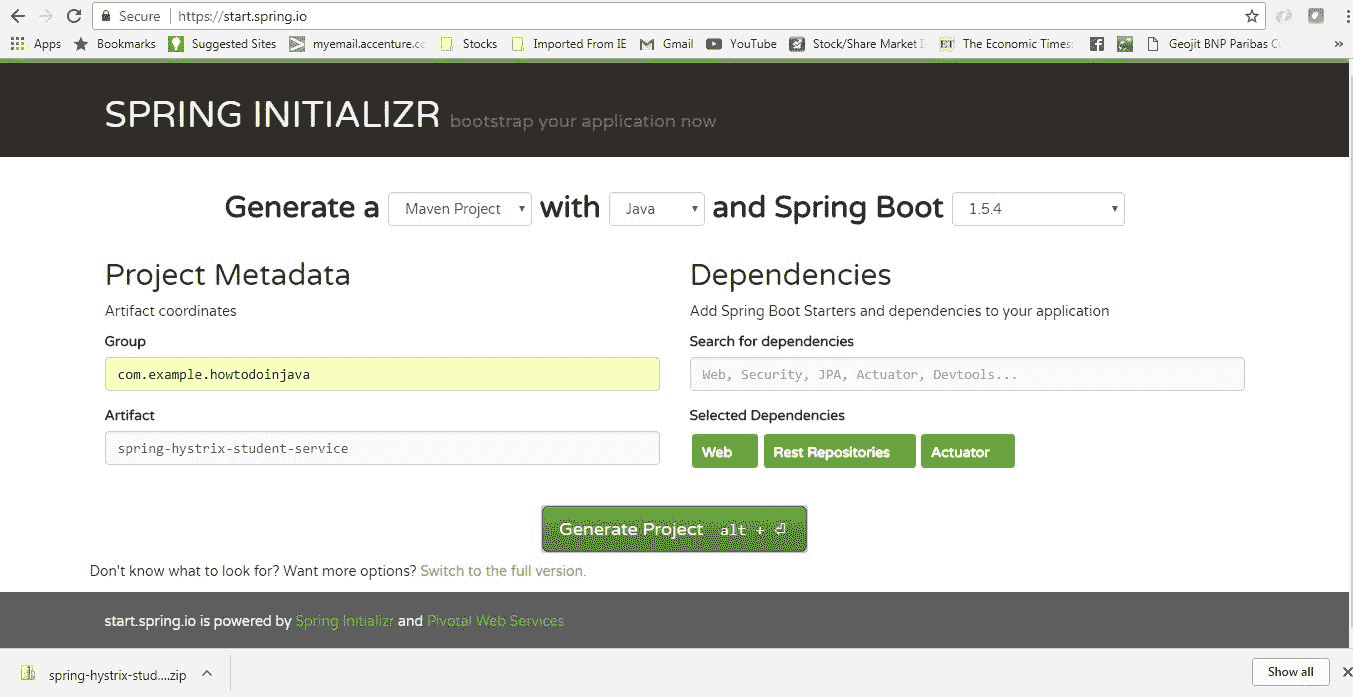
学生服务生成
将项目解压缩并将其作为现有的 maven 项目导入 Eclipse。 在此步骤中,将从 maven 存储库下载所有必需的依赖项。
服务器端口设置
打开application.properties并添加端口信息。
server.port = 8098
这将使该应用程序在默认端口 8098 上运行。通过在启动服务器时提供 -Dserver.port = XXXX参数,可以轻松地覆盖此应用程序。
创建 REST API
现在添加一个称为StudentServiceController的 REST 控制器类,并公开一个其余端点,以获取特定学校的所有学生详细信息。 在这里,我们公开/getStudentDetailsForSchool/{schoolname}端点来满足业务目的。 为简单起见,我们正在对学生详细信息进行硬编码。
StudentServiceController.java
package com.example.howtodoinjava.springhystrixstudentservice.controller;
import java.util.ArrayList;
import java.util.HashMap;
import java.util.List;
import java.util.Map;
import org.springframework.web.bind.annotation.PathVariable;
import org.springframework.web.bind.annotation.RequestMapping;
import org.springframework.web.bind.annotation.RequestMethod;
import org.springframework.web.bind.annotation.RestController;
import com.example.howtodoinjava.springhystrixstudentservice.domain.Student;
@RestController
public class StudentServiceController {
private static Map<String, List<Student>> schooDB = new HashMap<String, List<Student>>();
static {
schooDB = new HashMap<String, List<Student>>();
List<Student> lst = new ArrayList<Student>();
Student std = new Student("Sajal", "Class IV");
lst.add(std);
std = new Student("Lokesh", "Class V");
lst.add(std);
schooDB.put("abcschool", lst);
lst = new ArrayList<Student>();
std = new Student("Kajal", "Class III");
lst.add(std);
std = new Student("Sukesh", "Class VI");
lst.add(std);
schooDB.put("xyzschool", lst);
}
@RequestMapping(value = "/getStudentDetailsForSchool/{schoolname}", method = RequestMethod.GET)
public List<Student> getStudents(@PathVariable String schoolname) {
System.out.println("Getting Student details for " + schoolname);
List<Student> studentList = schooDB.get(schoolname);
if (studentList == null) {
studentList = new ArrayList<Student>();
Student std = new Student("Not Found", "N/A");
studentList.add(std);
}
return studentList;
}
}
Student.java
package com.example.howtodoinjava.springhystrixstudentservice.domain;
public class Student {
private String name;
private String className;
public Student(String name, String className) {
super();
this.name = name;
this.className = className;
}
public String getName() {
return name;
}
public void setName(String name) {
this.name = name;
}
public String getClassName() {
return className;
}
public void setClassName(String className) {
this.className = className;
}
}
建立并测试学生服务
现在,使用mvn clean install进行最终构建,并使用命令java -jar target\spring-hystrix-student-service-0.0.1-SNAPSHOT.jar运行服务器。 这将在默认端口8098中启动学生服务。
打开浏览器,然后输入http://localhost:8098/getStudentDetailsForSchool/abcschool。
它应在浏览器中显示以下输出:
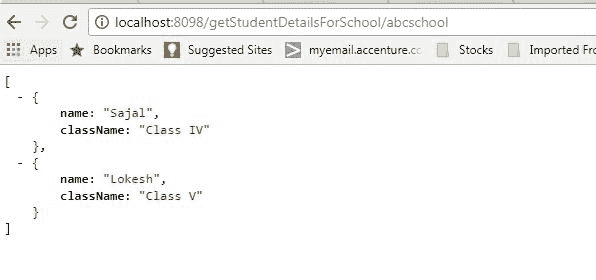
学生服务响应
创建学校服务 - 启用 Hystrix
与学生服务类似,为学校创建另一个微服务。 它将在内部调用已开发的学生服务。
生成 Spring Boot 项目
从 Spring Boot 初始化器页面主要使用那些依赖项创建一个 Spring Boot 项目。
- Web – REST 端点
- 执行器 – 提供基本管理 URL
- Hystrix – 启用断路器
- Hystrix 仪表板 – 启用一个与断路器监控相关的仪表板屏幕
给出其他 Maven GAV 坐标并下载项目。
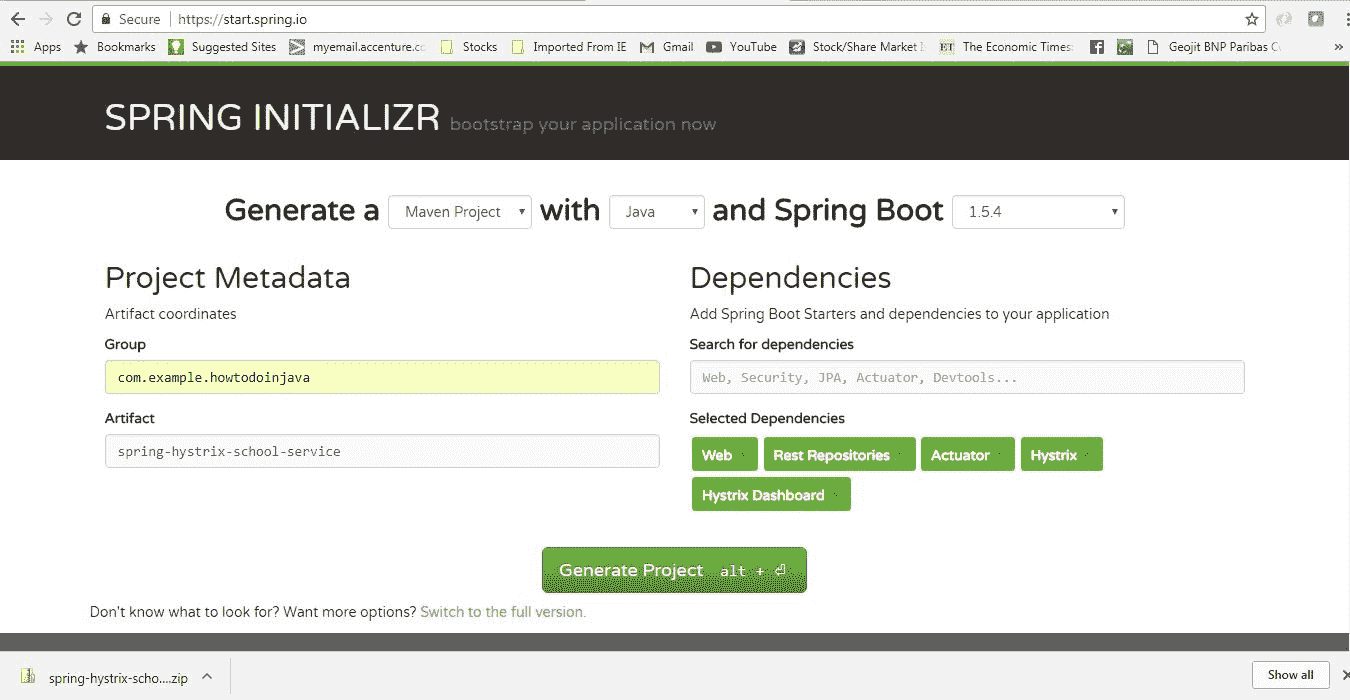
学校服务项目
将项目解压缩并作为现有 maven 项目导入到 Eclipse 中。 在此步骤中,将从 maven 存储库下载所有必需的依赖项。
服务器端口设置
打开application.properties并添加端口信息。
server.port = 9098
这将使该应用程序在默认端口 9098 上运行。通过在启动服务器时提供 -Dserver.port = XXXX参数,可以轻松地覆盖此应用程序。
启用 Hystrix 设置
打开SpringHystrixSchoolServiceApplication,即使用@SpringBootApplication生成的类,并添加@EnableHystrixDashboard和@EnableCircuitBreaker注解。
这将在应用程序中启用 Hystrix 断路器,还将添加一个在 Hystrix 提供的localhost上运行的有用仪表板。
package com.example.howtodoinjava.springhystrixschoolservice;
import org.springframework.boot.SpringApplication;
import org.springframework.boot.autoconfigure.SpringBootApplication;
import org.springframework.cloud.client.circuitbreaker.EnableCircuitBreaker;
import org.springframework.cloud.netflix.hystrix.dashboard.EnableHystrixDashboard;
@SpringBootApplication
@EnableHystrixDashboard
@EnableCircuitBreaker
public class SpringHystrixSchoolServiceApplication {
public static void main(String[] args) {
SpringApplication.run(SpringHystrixSchoolServiceApplication.class, args);
}
}
添加 REST 控制器
在我们将公开/getSchoolDetails/{schoolname}端点的位置添加SchoolServiceController Rest 控制器,该端点将仅返回学校详细信息及其学生详细信息。 对于学生详细信息,它将调用已经开发的学生服务端点。 我们将创建一个代表层StudentServiceDelegate.java来调用学生服务。 这个简单的代码看起来像
SchoolServiceController.java
package com.example.howtodoinjava.springhystrixschoolservice.controller;
import org.springframework.beans.factory.annotation.Autowired;
import org.springframework.web.bind.annotation.PathVariable;
import org.springframework.web.bind.annotation.RequestMapping;
import org.springframework.web.bind.annotation.RequestMethod;
import org.springframework.web.bind.annotation.RestController;
import com.example.howtodoinjava.springhystrixschoolservice.delegate.StudentServiceDelegate;
@RestController
public class SchoolServiceController {
@Autowired
StudentServiceDelegate studentServiceDelegate;
@RequestMapping(value = "/getSchoolDetails/{schoolname}", method = RequestMethod.GET)
public String getStudents(@PathVariable String schoolname) {
System.out.println("Going to call student service to get data!");
return studentServiceDelegate.callStudentServiceAndGetData(schoolname);
}
}
StudentServiceDelegate
我们将在此处执行以下操作以启用 Hystrix 断路器。
- 通过提供的 Spring 框架调用学生服务
RestTemplate - 添加 Hystrix 命令以启用回退方法 –
@HystrixCommand(fallbackMethod = "callStudentServiceAndGetData_Fallback")– 这意味着我们将不得不添加另一个具有相同签名的方法callStudentServiceAndGetData_Fallback,当实际的学生服务关闭时将调用该方法。 - 添加后备方法 –
callStudentServiceAndGetData_Fallback,它将仅返回一些默认值。
package com.example.howtodoinjava.springhystrixschoolservice.delegate;
import java.util.Date;
import org.springframework.beans.factory.annotation.Autowired;
import org.springframework.context.annotation.Bean;
import org.springframework.core.ParameterizedTypeReference;
import org.springframework.http.HttpMethod;
import org.springframework.stereotype.Service;
import org.springframework.web.client.RestTemplate;
import com.netflix.hystrix.contrib.javanica.annotation.HystrixCommand;
@Service
public class StudentServiceDelegate {
@Autowired
RestTemplate restTemplate;
@HystrixCommand(fallbackMethod = "callStudentServiceAndGetData_Fallback")
public String callStudentServiceAndGetData(String schoolname) {
System.out.println("Getting School details for " + schoolname);
String response = restTemplate
.exchange("http://localhost:8098/getStudentDetailsForSchool/{schoolname}"
, HttpMethod.GET
, null
, new ParameterizedTypeReference<String>() {
}, schoolname).getBody();
System.out.println("Response Received as " + response + " - " + new Date());
return "NORMAL FLOW !!! - School Name - " + schoolname + " ::: " +
" Student Details " + response + " - " + new Date();
}
@SuppressWarnings("unused")
private String callStudentServiceAndGetData_Fallback(String schoolname) {
System.out.println("Student Service is down!!! fallback route enabled...");
return "CIRCUIT BREAKER ENABLED!!! No Response From Student Service at this moment. " +
" Service will be back shortly - " + new Date();
}
@Bean
public RestTemplate restTemplate() {
return new RestTemplate();
}
}
建立和测试学校服务
现在,使用mvn clean install进行最终构建,并使用命令java -jar target\spring-hystrix-school-service-0.0.1-SNAPSHOT.jar运行服务器。 这将在默认端口 9098 中启动学校服务。
如上所述启动学生服务,然后通过打开浏览器并键入http://localhost:9098/getSchoolDetails/abcschool来测试学校服务。 它应该在浏览器中显示以下输出:

学校服务响应
测试 Hystrix 断路器 - 演示
打开浏览器,然后输入http://localhost:9098/getSchoolDetails/abcschool。
它应在浏览器中显示以下输出:

学校服务响应
现在我们已经知道,学校服务在内部调用学生服务,并且正在从该服务获取学生详细信息。 因此,如果两个服务都在运行,则学校服务将显示学生服务返回的数据,正如我们在上面的学校服务浏览器输出中所看到的那样。 这是电路关闭状态。
现在,让我们停止学生服务,只需在学生服务服务器控制台中按CTRL + C(停止服务器),然后从浏览器再次测试学校服务。 这次它将返回回退方法响应。 Hystrix 出现在这里,它会频繁地监视学生服务,并且在停机时,Hystrix 组件已打开电路并启用了后备路径。
这是浏览器中的回退输出。

学校服务响应回退路径
再次启动学生服务,等待片刻,然后返回学校服务,它将再次开始以正常流程进行响应。
Hystrix 仪表板
当我们添加了 hystrix 仪表板依赖时,hystrix 在以下 URL 中提供了一个不错的仪表盘和 Hystrix 流:
-
http://localhost:9098/hystrix.stream– Hystrix 产生的连续流。 这只是健康检查结果以及 Hystrix 正在监视的所有服务呼叫。 示例输出在浏览器中将如下所示: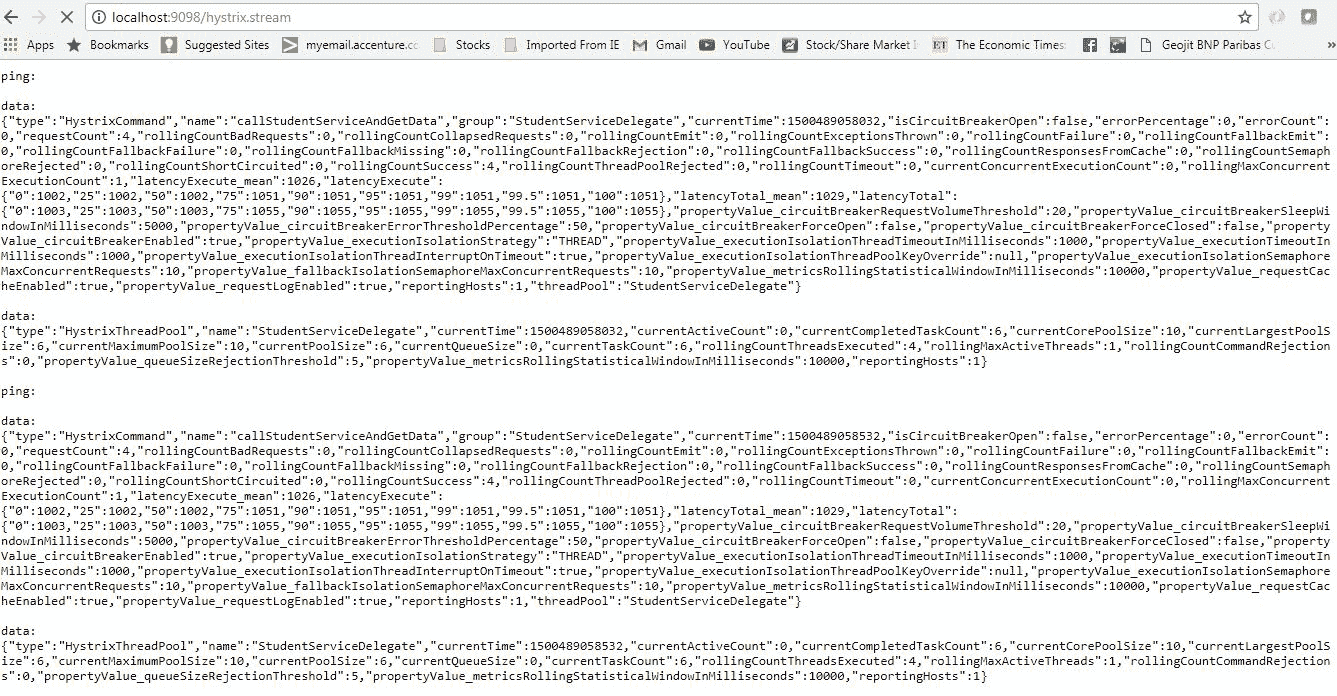
Hystrix 流式输出
-
http://localhost:9098/hystrix– 这是可视仪表板的初始状态。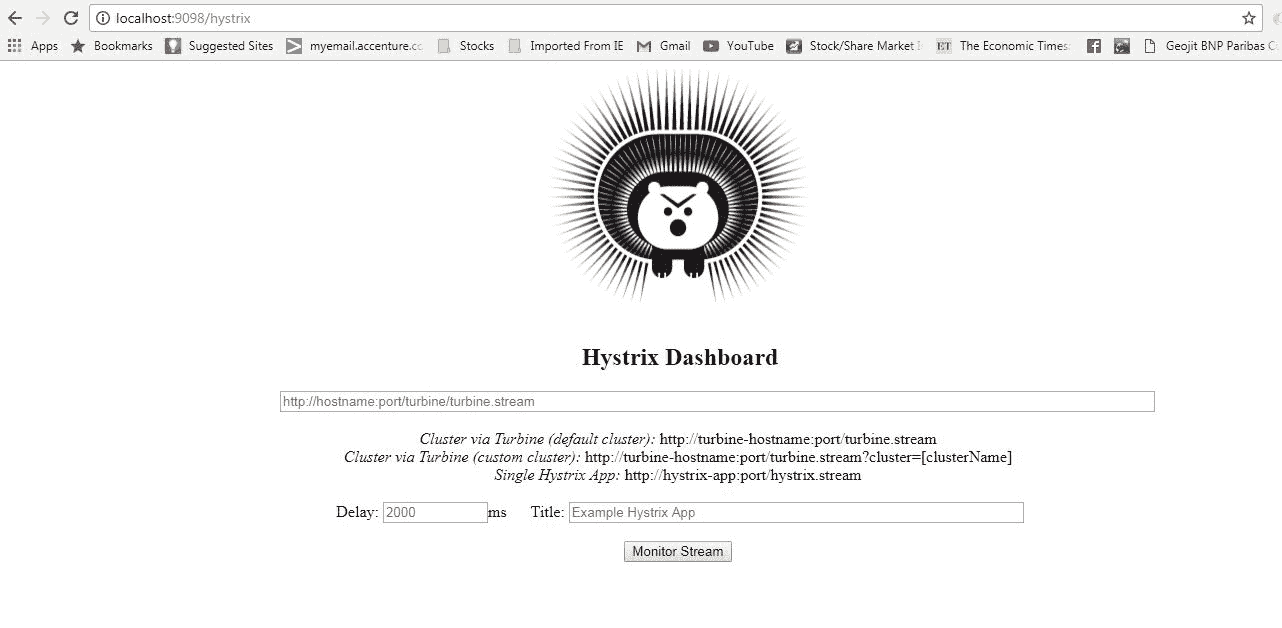
Hystrix 初始仪表盘
-
现在,在仪表板中添加
http://localhost:9098/hystrix.stream,以获得由 Hystrix 组件监视的电路的有意义的动态视觉表示。 在主页中提供流式输入后的虚拟仪表盘: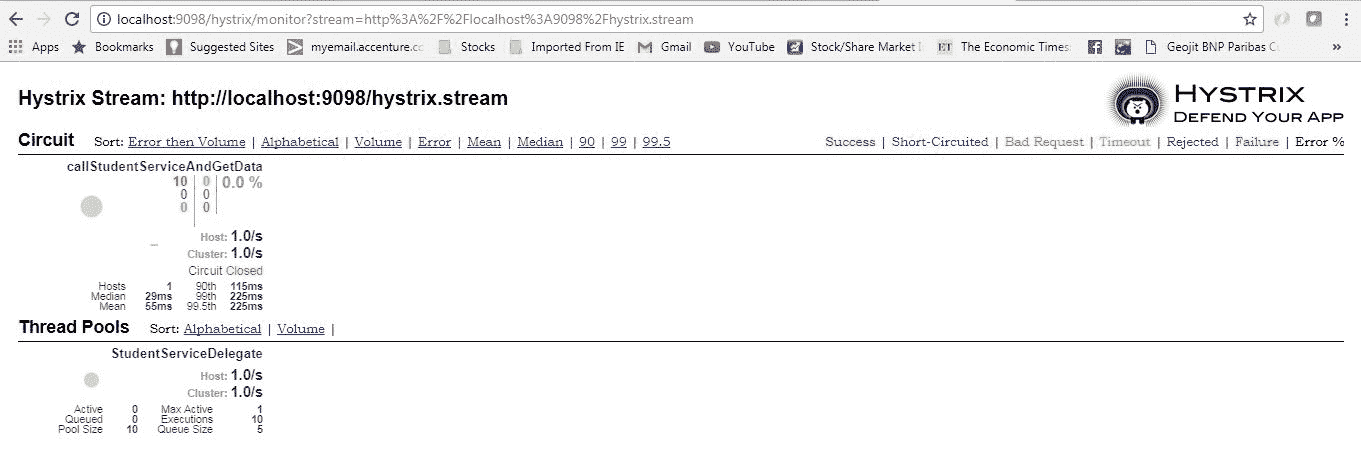
Hystrix 虚拟仪表盘
总结
这就是可以制造 Spring 开关 Hystrix 断路器的全部内容,我们已经测试了电路开放路径和电路闭合路径。 自行进行设置,并使用不同的组合服务状态以更清楚地了解整个概念。
如果您在执行本文时遇到任何困难,请添加评论。 我们将很乐意调查这个问题。
学习愉快!